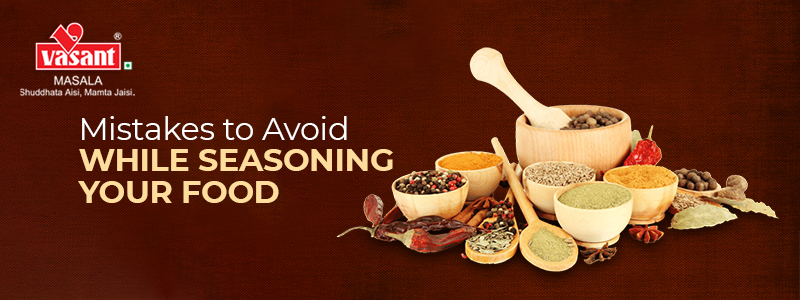
The ability to grasp the delicate process of seasoning your food is one of the most significant distinctions between an amateur and an expert cook. Here are 7 mistakes you should avoid while working with seasonings.
Seasoning and spices may be challenging to master, especially if you're new to cooking. Keep an eye out for them before you make these typical seasoning blunders.
The ability to grasp the delicate process of seasoning your food is one of the most significant distinctions between an amateur and a more expert cook. It's not as simple as sprinkling a little spice on your food and calling it a day. Getting to know how much seasoning to use becomes second nature as you gain more culinary expertise, but getting there takes time.
Here are a few common seasoning mistakes and how to rectify them so that you can improve your culinary skills.
Without further ado, let's get on with it.
Mistakes to Avoid While Working with Seasonings-
Not Using Enough Salt:
One of the most important ingredients in every meal is salt. Not only is it a necessary nutrient, but it also interacts with food and aids in the release of molecules into the air, giving your food a pleasant aroma and adding to your meal satisfaction. If used correctly, salt can transform your bland dish into a flavourful miracle, but if not, it will turn out to be bland or overly tasteless.
When cooking, using too little salt, too much salt, or no salt at all might be disastrous. While certain seasoning ingredients serve a specific purpose in the meal by imparting their inherent tastes, some dishes require an extra boost of flavour to stand out.
Not Sampling As You Go:
You want your efforts to be rewarded when you have put so much effort into a dish, so it might be frustrating to sit down to dine only to realise the flavour is off. Test your meal during the cooking phase to avoid this. You should use two-different spoons to guarantee that you don't mix them up. Always pick up the item you wish to taste with one spoon and place it on the other spoon for tasting.
Overseasoning Your Food:
Overseasoning your food is a common blunder, and it's easy to add too much too soon, so test your meal as you go. It's never pleasant to work your way through a meal that tastes too strong, but it's much worse when you have to toss it out because the spice is too much. To avoid overseasoning, taste the food as you go to ensure you strike the sweet spot without overwhelming it.
Not Using Freshly Cracked Black Pepper:
Cracked black pepper is prepared by hand, using a pepper mill to grind peppercorns as needed. Regular ground pepper, the kind you get in a tin at the supermarket, is ground weeks to months before it's sold. Well, you ask- what difference does it make? When you use cracked black pepper, you're not only giving your food a more pungent taste, but you're also giving it a texture that plain ground pepper can't provide. If you must use store-bought black pepper, make sure it comes from a reputable spice manufacturer, such as Vasant Masala, which guarantees that all of the seasonings you receive are of the highest quality and fresh.
Not Using Lemons:
Lemons may add a lot to a meal, especially if it's missing something extra. Are you preparing a pan sauce for paneer tikka? By adding some freshly squeezed lemon right at the end, you may take the sauce to the next level. Also, don't forget to add some lemon juice to your raw vegetables. Asparagus, green beans, broccoli, and salads are all delicious with it.
Using Stale Spices:
Many people are unaware that spices may go stale. When you buy pre-ground seasonings from a supermarket, many of them are already a little stale. They won't necessarily spoil your dish, but fresh spices may have a much greater influence on the end product. Purchasing fresh seasonings and grinding them yourself using a low-cost blade grinder may enrich your cuisine far more than you would imagine.
Only Seasoning Once:
Seasoning isn't something you do once and then forget about it. Only seasoning things before you start cooking is a typical seasoning error to avoid. Seasoning should be added as you cook to ensure that it is well incorporated into the meal. In these circumstances, tasting as you go is critical, as you must be able to recognise what your dish requires even while it cooks in order to achieve the optimum flavour. When tasting, you may notice that it lacks flavour; if this is the case, season with salt and red chilli powder, and add turmeric powder if the meal lacks the colour you desire.
Also read: How Do You Check the Quality of Spices?

